Learning to manage your food budget is one of the fastest ways to start turning around your family household budget. We see so many families practice grocery shopping habits that drive their food costs through the roof.
If you’ve never been shown how to master the art of food shopping and meal prep, don’t feel bad.
It’s a much easier game to learn than you realize.
Take the Quiz and See How You Do
Put a checkmark next to any statement that describes something you’ve said or done in the past six months:
1) I go to the store several times each week.
Going to the store several times each week increases the likelihood that impulse items will end up in your cart. And that will increase your grocery bill. Grocers expect that 60 percent of the items in your cart will be impulsive purchases. So you’ve got to prove them wrong.
If you want to see how your shopping habits compare to thousands of others, participate in our Grocery Shopping Poll.
2) I regularly go to the store around dinner time or some other time when I’m hungry.
Shopping when you’re hungry increases the number of items you’ll put in your cart. Everything looks so good to eat at mealtime, especially Cheetos and anything dipped in chocolate. The food budget suffers, but it doesn’t have to.
3) I never use a list — I can remember everything I need to pick up, in my head … now, where are my car keys?
It’s impossible to remember everything you need to buy — especially if they’re infrequently purchased items such as toilet paper, cornstarch, onion soup mix, baking soda or salt. Writing a list keeps you on track and eliminates additional trips for forgotten items, thus saving your food budget. Get our Free Grocery Shopping List here
4) I don’t need an official list, I just use a piece of scrap paper or an old envelope and jot down a few items to pick up as I’m heading out the door.
Scribbling on an envelope or piece of scratch paper increases the chances that your list will be misplaced. Making your list just prior to walking out the door increases your chances of forgetting something important.
5) I don’t have time to plan a menu. And anyway once I get to the store I just pick up what I feel like eating — I’m just catering to my inner child.
Planning can save you hundreds, if not thousands of dollars each year. At first, planning a menu will seem tedious, but after you develop a repertoire and a routine, it will only take a few minutes. Your family and food budget will thank you!
6) I don’t bother looking at the grocery store ads in the newspaper, I just buy what sounds good to me at the time.
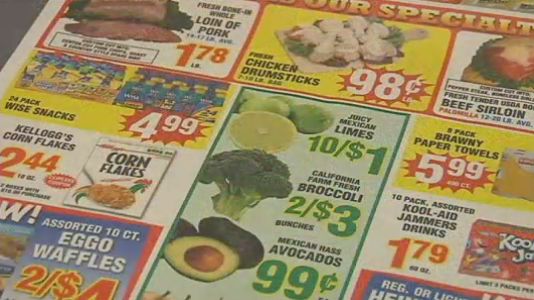
Reviewing the food ads and noting what is on sale will save you tons of money— provided you purchase the sale items and then plan your menu around them. Over time as you regularly buy items at their lowest price and stock up on them, you’ll always be eating bargain-priced food, and your food budget will smile. Eventually, you should be able to make “loss leaders” account for 60 to 70 percent of the items you buy on each trip. Just imagine 70 percent of your groceries being bought for 30 to 40 percent below regular retail price!
7) I always take my kids with me to the store. Sure they grab a few things and throw a tantrum or two, but I’m only going in to pick up a few items — how harmful can that be?
It’s impossible to be able to evaluate your purchases carefully and to calculate your cost per unit when your kids are complaining, grabbing for things or running in the aisles. Give yourself and your kids a break and get a sitter. You’ll easily recover the cost of the sitter with the savings you are able to garner thus extending your food budget.
8) I food shop whenever I’m out and about running errands or driving from one kid’s activity to another.
Food shopping should be a regularly scheduled event — kind of like a haircut. Don’t go shopping when the cupboards are bare and you’ve only got a few minutes after work or after dropping the kids off at sports practice. Keeping your pantry, refrigerator and freezer well-stocked will eliminate multiple trips to the store.
9) I always have a grumbling spouse or elderly parent with me when I go shopping, even though they hate running this errand.

If you have an elderly parent who doesn’t like to shop, have a friend come over to sit with them while you go. And if your spouse hates shopping, try to get him or her to read our book or talk to them about the concept of teamwork and how helpful they could be to you. If that doesn’t work, see if they’ll stay home or have them drop you off at the store while they go run other errands such as the post office, home improvement store or gas station.
10) I usually don’t have time to put all of the groceries away, wash the produce or divide the larger quantities when I get home.
Carefully putting your perishables away and dividing items purchased in bulk into smaller portions takes time. Washing produce that has been handled by countless people will make it last longer in your refrigerator. Make sure you allow time to deal with your produce, or your savings will become a science project (moldy) and/or fodder for the compost pile.
11) I don’t bother checking what I have in my pantry. It’s just easier to buy new stuff than to take the time to inventory what I already have.
Buying unneeded items is wasting your precious time. A few minutes of review and preparation can save hundreds of dollars each year on your food budget.
12) At the checkout, I’d rather relax, look at the magazines or do anything but watch the cashier and the prices as my order is processed.
The checkout lane is the time to pay close attention — especially if you’ve purchased many sale or close-out items. Put those things up on the grocery belt first, when your mind is fresh. If you watch closely, you may get several items for free. Many stores have a scanner accuracy policy so if you catch an error you will be able to get one item for free.
13) I know I should be concerned about saving money, but what’s the big deal about trying to save 50¢ on a box of cereal?
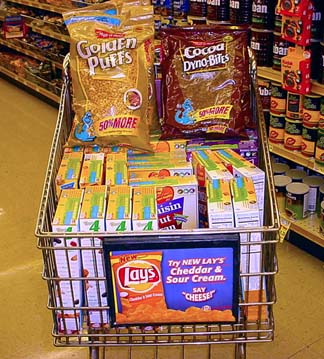
Paying attention to the little things certainly does add up. Using the strategies outlined in this article will allow you to make some huge gains in saving money this year. Saving just $10 each week will put $520 back into your bank account each year.
14) My life is already too structured and planning all this grocery stuff is too much! Anyway, a spontaneous dinner is so fun and so romantic.
Planning— ugh — it’s definitely not romantic or spontaneous, but it can give you some time for romance and spontaneity. Planning is a foundational tool for saving money and time. The more you plan ahead, the more your stress level will diminish. And the more money you will have for your food budget.
15) It would take me days to organize my kitchen, refrigerator, and freezer. If I really need something I can’t find, I can just run to the store to pick it up.
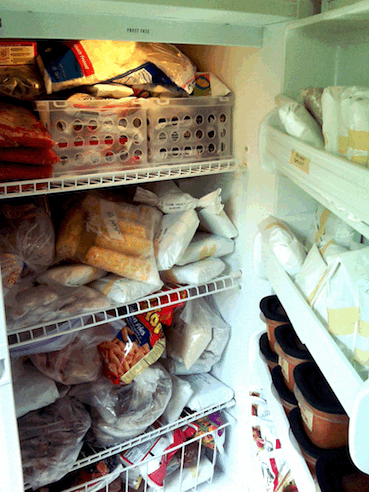
Having your kitchen organized helps you prepare for unexpected occurrences. Like Guests dropping by, last-minute treats needed for a school class, or a meal for a sick friend. If you can find what you have stocked in your pantry, refrigerator, and freezer, then these events can be handled with poise and peace.
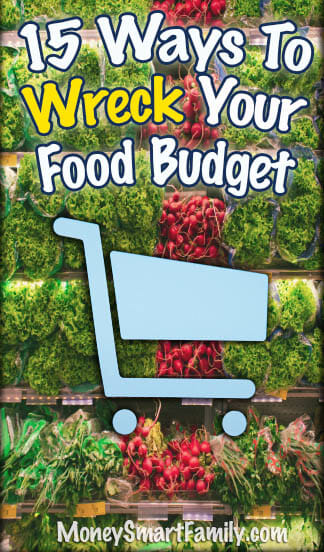
Scoring Summary for managing Your Food Budget
Okay, we know this was a pop quiz. How did you do?
10 or more points — you are spending unneeded hours of precious time each week dealing with groceries.
6 to 9 points — indicates that you’re getting smarter, but can still see some significant savings with a little more planning. You can shave hundreds of dollars off your food budget by making a few changes.
3 to 5 points — pat yourself on the back; you’ve learned to plan and save and are well on your way to becoming a super saver.
0 to 2 points — Congratulations! You’ve got it down — you’re a hunter; you get in, pick it up and get out of the store in record time, with money to spare. Stand on your chair and give a Tarzan (or Jane) yell — you are the King / Queen of the grocery jungle.
If you need to improve, just pick one or two areas to focus on for the next 30 days, and you’ll start to see the savings add up. Keep track of how much less money you’re spending and let us all know. We’ll send up a cheer for you and share your successes with our readers.
Get Started Saving Now!
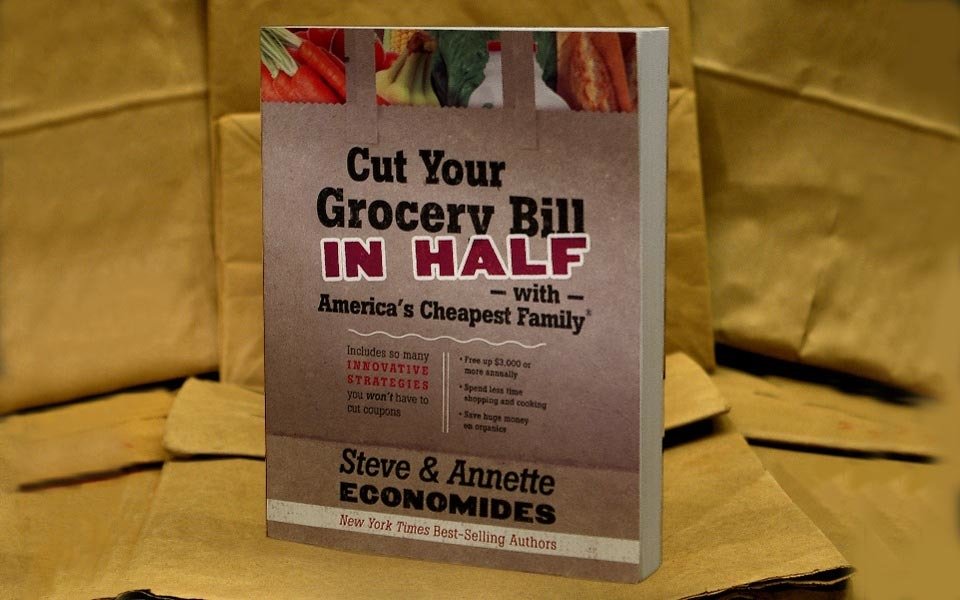
If you really want to reduce what you spend on groceries, visit our Grocery savings landing page and check out our book, Cut Your Grocery Bill in Half or download our Free Shopping List! Just by applying one or two tips we’ve written about, you’ll see the savings start to pile up!
We’d also love to have you follow us on our Facebook Fan page! It has lots of great money-saving ideas.


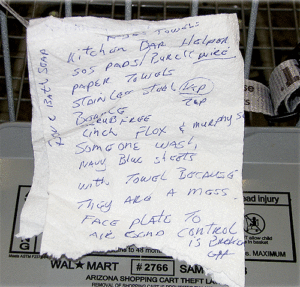

Have tried to read all of your printed info. Thought I had your “Cut Your Food Bill In Half but maybe not? If not will search for it! Are all your kids still at home? Do they, as adults still follow your money saving practices? Keep up the great work and keep sharing!
I have been following these ideas for years. As I realize I am about to be out of an ingredient, it goes on the list. I have a tight budget for one person ($20 week), so I might not be able to get all the ingredients I keep stocked up on, in one week. So I plan what I will eat, around what ingredients I have, not what I necessarily want. It took three weeks to get a corned beef, cabbage, carrots, onions and potatoes for my traditional St. Patrick’s Day meal. But I ended up with a delicious meal, and many more to come, including a whole cabbage shredded up and in the freezer for adding to soup.
To me, it is all about having enough ingredients on hand to make several meals – eggs are both an ingredient and an entrée (breakfast and dinner), asparagus is also an ingredient – as a side dish, as a salad and as an ingredients in an omelet. Asparagus is also seasonally on sale, so that is when I eat it. Canned mile green chilies are also a constant stock-up ingredient for me.
By only shopping weekly, I save by not “seeing a good deal that I can’t pass up” at a different time. I shop the main grocery store, the produce market and a smaller local grocery store, in that order, weekly. Once a month, I shop at BJ’s (cheese is less expensive there), and won’t go more often than that. I also hit Walmart at the same time.
I also know the sales “cycle” for different things. Mostly it is 6-12 weeks. I know peanut butter is 6 weeks, so there is a jar on the list(I keep 4-6 on the shelf at all times) when I finish one. That way I only pay the lowest price to keep 4-6 jars in stock at all times.
Some things are just seasonal – canned pumpkin comes to mind. I buy a few cans when they are on sale, and buy a couple of pie pumpkins, cook and freeze them in 2 cup portions and that way I have some all year long.
I also cook more than I will eat at one time – planned leftovers. I work 4 10-hour days and don’t often feel like preparing a meal when I get home. To keep from caving for take out – I prepare servings of rice, baked potatoes, baked sweet potatoes, chicken, ribs, roast beef, etc. ahead of time, and just add a side veggie as I pick different combinations of these “ingredients”. Add in pre-packaged homemade meat balls, homemade meatloaf,homemade hamburgers, and hot dogs, and frozen breaded fish filets, and you have 2-3 weeks of choices. Then it is no problem to add a salad or steam a veggie to round out the meal that can be just re-heated in the microwave at the end of a busy day.
Norma, you are a grocery planning super-star! Especially love how you’ve mastered the grocery sales cycle and only buy peanut butter when it is a rock bottom prices. Way to go. Thanks for sharing your strengths!
The rules change when you are a retired widow living g alone. If I don’t shop frequently for small amounts, I revert to my days of shopping for a husband and teenage boys and buy more than I will eat or want to eat. I know what is in my pantry and prefer to add and consume the freshest items possible several times a week.
Thanks for sharing your perspective – it sounds like you’ve discovered the right rhythm for you. It is so hard to go from shopping for several to solo. Keeping careful track of what’s in your pantry does reduce over buying AND waste through spoilage. You’re doing great!
Yes, I do write my list on scrap paper but I use the uused back of scrap COLORED paper I get in the mail to do it and use different colors each time. easy to find in my handbag!
Jean
Jean – re-purposing blank “junque” mail for shopping lists is super smart and the fact that the lists are on colored paper makes them easier to find. Way to go!
I love the format of this post! I’ve never seen a blogger do this. I probably go to the grocery store too often, but it’s necessary when fruits and vegetables go quick pretty fast.
Alexis, thanks for commenting. Regarding fruits and veggies, you can get them to last longer if you store them properly. We cover that in our book, Cut Your Grocery Bill in Half. Heads of lettuce can last for 2 to 3 weeks. Apples last for a month. Pears can last about 2 weeks. When the kids were younger and we were shopping only once each month, we would eat the most perishable fruits and veggies the first week, then work through the rest of the month eating the remainder. Remember that frozen fruits and veggies retain most of their nutritional value, so we did rely on them near the end of the month. Let us know how you do with cutting your grocery bill!
I thought I did pretty good, but it’s time to get your book out and read it again!!!
Go for it Tricia- you’re constantly learning and are in a different place now than when you first read it. We’re sure you’ll find ways to save that will work now, that didn’t work before. Keep going – savings only get easier with practice.